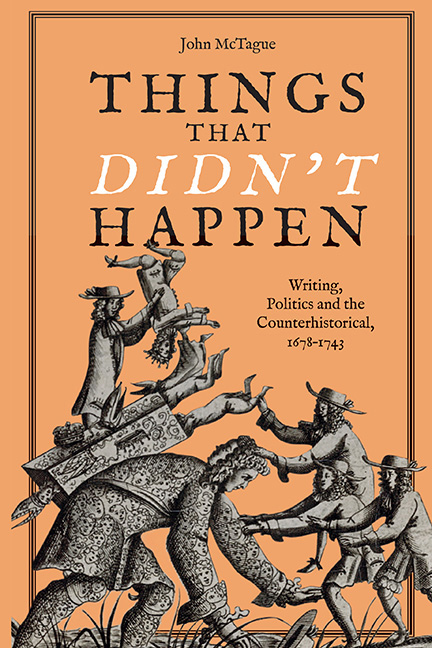Book contents
- Frontmatter
- Dedication
- Contents
- List of Illustrations
- Acknowledgements
- List of Abbreviations
- Introduction
- I Fabrications
- II Failures
- III Speculations
- IV The Dunciads
- 7 Living in Counterhistory: The Dunciads as Mock-Prophecy
- 8 The Indifference of the Dunces: Agency in the Dunciads
- 9 Gravitation, Providence, and Theories of History in the Dunciads
- Conclusion: Events that Didn't Happen
- Bibliography
- Index
9 - Gravitation, Providence, and Theories of History in the Dunciads
from IV - The Dunciads
Published online by Cambridge University Press: 09 October 2019
- Frontmatter
- Dedication
- Contents
- List of Illustrations
- Acknowledgements
- List of Abbreviations
- Introduction
- I Fabrications
- II Failures
- III Speculations
- IV The Dunciads
- 7 Living in Counterhistory: The Dunciads as Mock-Prophecy
- 8 The Indifference of the Dunces: Agency in the Dunciads
- 9 Gravitation, Providence, and Theories of History in the Dunciads
- Conclusion: Events that Didn't Happen
- Bibliography
- Index
Summary
THE multiple significances of the word ‘accident’ and its variants have been explored throughout this study, and intensively in the foregoing pages, where it has been posited: that The Dunciad is concerned with the eradication in Hanoverian culture of the difference between the accidental and the substantive; that the dunces are obsessed with accidentals, the superficies of scholarship, or things indifferent; that the dunces’ modus operandi, and that of their goddess, is to make the accidental central; that to see a dunce stripped of their accidental qualities, as one might see a hero of epic poetry or history painting, is for Pope (following his friend Berkeley) to see them as God intended; that, relatedly, for the dunces those qualities normally considered central to personhood are deemed to be accidental by Pope, and stripped, for the dunces are marked and driven in his poem chiefly by their substantive crimes; that, related again, the prophetic mode (and by extension ‘divine’ epopea) tends to obliterate the accidental, for to the divine sight nothing is insignificant because no cause or intention goes unperceived; that, finally, the identification and historical identity of the dunces is really central to the poem, but, after Le Bossu, is said to be accidental. All of this still stands, as does the recurrent discussion in this study of the ways in which propaganda eschews the accidental in favour of narrative connections and the probability that they produce, or at least simulate. However, the Dunciads offer an opportunity to think through the etymology of the word ‘accident’ and its variants in detail, and doing so allows us to see the ways in which counterhistorical propaganda, accidents, falling, concordia discors and providence are interconnected in this poem, and in this period. It allows us to see, in the global and cataclysmic scale The Dunciad insists on at its climax, the ways in which history is made and arguments are won by flattening or denying contingency. It also helps to reveal Pope's theories of history.
The noun accident derives from the Anglo-Norman or Middle French accident meaning ‘unfortunate occurrence or incident, vicissitude of fortune, indication, exterior sign, symptom (all 12th cent.
- Type
- Chapter
- Information
- Things that Didn't HappenWriting, Politics and the Counterhistorical, 1678–1743, pp. 223 - 248Publisher: Boydell & BrewerPrint publication year: 2019



